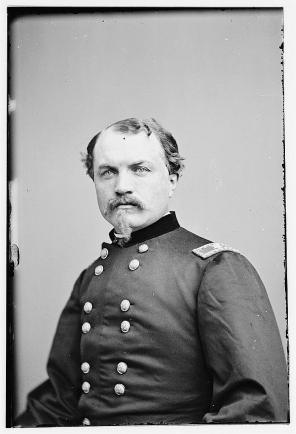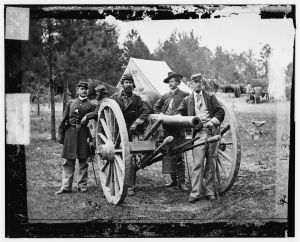…chucking this Tidball book across the room. But first, some background:
Above (click for larger image), Capt. John C. Tidball and officers of Battery A, 2nd US Artillery, June, 1862. Left to right: Lt. Robert Clarke, Tidball, Lt. William Dennison, Lt. Alexander C. M. Pennington – Image from LOC. Tidball was a regular army artillery officer, West Point class of 1848. At First Bull Run, he commanded Company (Battery) A, 2nd US Artillery, in Blenker’s brigade. Although not engaged, he wrote a vivid and influential account of his experiences there – you can read some of it here. Later his battery would become part of the First Horse Artillery Brigade.
There are some things that make the book quite valuable. The author (Eugene Tidball) makes extensive use of the writings of his subject. But I’m thinking this book would have been much better and more useful if it just presented the Tidball writings with minimal annotations. Where the book falls short – far short – is in the narrative. Each paragraph seems to contain three or four quoted passages. Contemporary quotations, often John Tidball’s, are frequently mixed with quotations from modern authors. This creates some confusion, and could reasonably lead the reader to understand that these quotes of modern authors’ opinions are somehow contemporary and authoritative. Only careful reading of the citations and in most cases tracing to the source puts them in proper perspective. In particular, the opinions of the single author of To the Gates of Richmond, Landscape Turned Red, and Chancellorsville are quoted extensively in the chapters on the Peninsula/Seven Days, Antietam, and Chancellorsville. The author appears in a quandary when the opinions of his subject conflict with those of a late 20th century writer who, based on the number of cites to these works, may be assumed to be his favorite “historian”. For instance, at one point Eugene Tidball notes that George McClellan wrote that the administration was being less than supportive of the Army of the Potomac. When John Tidball himself expressed the same opinion, repeatedly and in much stronger terms, the author concludes that it is evidence of the effectiveness of McClellan’s “propaganda”, rather than simply Tidball’s evaluation of the situation (p. 233). Either could be true (for example, folks as far away from the Army of the Potomac as William T. Sherman were of a similar opinion at the time, and Tidball still maintained his belief long after the war was over), but if one conclusion is favored over another there should at least be some semblance of support presented. In fairness to Eugene Tidball, given his heavy reliance on the opinions of this particular author for this time-frame (a cursory review shows 23 cites for To the Gates of Richmond, and eleven each for Landscape Turned Red and Chancellorsville, most with direct quotes from the author), it’s difficult to see how he could even consider other possibilities. That Eugene Tidball manages to produce more venom at the mere mention of McClellan’s name than even the author of the “reference” works he cites is no small achievement.
The author also sets aside a special place in hell for cavalryman William W. Averell (image from LOC). In part this seems to be due to the fact that  John Tidball resented serving under Averell, who was his junior in the regular army. (One thing this book does very well is drive home the importance of rank and seniority in the regular army. While we tend to view such things as petty, John Tidball wrote: “Promotion is the lifeblood of the soldier and anyone who disregards it is not worthy of the name”, p 273.) However if one is familiar with the book Chancellorsville one is aware that the vilification of Averell is part and parcel to its author’s attempt to rehabilitate the reputation of Joseph Hooker. Eugene Tidball presents one quote from John on p. 272, after he had been placed under the command of Averell: “I do not believe he has taken part in any of the battles: yet he was made a brigadier general for a battle which he was not near.” The author fails to mention that, while his subject was cooling his heels at Centreville during First Bull Run, Averell had been in the thick of the fighting, taking command of Andrew Porter’s brigade (Averell was Porter’s AAAG) when the latter succeeded the wounded David Hunter as division leader. (Averell left behind an equally vivid and influential memoir of First Bull Run in Ten Years in the Saddle.) John Tidball’s comment regarding the basis for Averell’s promotion to Brigadier General US Volunteers (BGUSV) is curious because, unlike regular army (USA) promotions and brevets, USV promotions and brevets were not made for specific performance such as gallant and meritorious service. At that time Averell did have one brevet to major USA for his service at Kelly’s Ford on 3/17/63, an action during which he was in command of the Union forces involved. Predictably, the author’s summary of the role of Averell’s command in the Chancellorsville Campaign appears to be heavily influenced by the above named modern study.
John Tidball resented serving under Averell, who was his junior in the regular army. (One thing this book does very well is drive home the importance of rank and seniority in the regular army. While we tend to view such things as petty, John Tidball wrote: “Promotion is the lifeblood of the soldier and anyone who disregards it is not worthy of the name”, p 273.) However if one is familiar with the book Chancellorsville one is aware that the vilification of Averell is part and parcel to its author’s attempt to rehabilitate the reputation of Joseph Hooker. Eugene Tidball presents one quote from John on p. 272, after he had been placed under the command of Averell: “I do not believe he has taken part in any of the battles: yet he was made a brigadier general for a battle which he was not near.” The author fails to mention that, while his subject was cooling his heels at Centreville during First Bull Run, Averell had been in the thick of the fighting, taking command of Andrew Porter’s brigade (Averell was Porter’s AAAG) when the latter succeeded the wounded David Hunter as division leader. (Averell left behind an equally vivid and influential memoir of First Bull Run in Ten Years in the Saddle.) John Tidball’s comment regarding the basis for Averell’s promotion to Brigadier General US Volunteers (BGUSV) is curious because, unlike regular army (USA) promotions and brevets, USV promotions and brevets were not made for specific performance such as gallant and meritorious service. At that time Averell did have one brevet to major USA for his service at Kelly’s Ford on 3/17/63, an action during which he was in command of the Union forces involved. Predictably, the author’s summary of the role of Averell’s command in the Chancellorsville Campaign appears to be heavily influenced by the above named modern study.
I think that so far (I’ve got about 200 pages to go) the author has not done much to explore why Tidball did not earlier and more actively pursue a volunteer command. Many of his contemporaries and juniors – like Averell – did so, with good effect on their rank and prestige. Tidball was obsessed with rank, and yet until August 1863 stubbornly remained in the regular artillery when all the while the volunteers was the obvious path of least resistance.
But I don’t want to throw the baby out with the bathwater. I think the strengths of “No Disgrace to My Country”, the Life of John C. Tidball so far lay in its presentation of life in the antebellum army and in the primary Tidball material. But the reliance on and quoting of secondary sources in the narrative is an infuriating distraction.


C’mon Harry. We can say this “historian’s” name can’t we? I know it’s not Voldemort …
I have the same problem as you with authors who treat “Landscape” and the others as if they were primary sources. Lazy, at best.
LikeLike
_____ & Roebuck.
LikeLike
Brian & Drew,
As a matter of fact, it is Voldemort.
LikeLike
Harry,
Books are our friends, don’t throw them.
About a year and a Hho a friend loaned me E.L. Doctorow’s book “The March” (have you read it?).
Harry, I don’t usually spend much time with fictional accounts, but c’mon man, this is Doctorow!
I think it was page 53 that made me want to hurl the book across the room..It was a paragraph which propped up the old, and untrue, saw about Grant being an alcoholic.
But I paused in my disgust and didn’t hurl the book (this is Doctorow Man!).
Instead, I just tucked the book away for a few days, cut the author some slack (thankful for “Ragtime”) and resumed reading several days later. The book was, despite certain historical flaws, a wonderful piece of art.
I returned the novel to my friend with the book’s spine uninjured, and my drywall undented. Keep reading…without throwing.
Best wishes,
Mannie Gentile
LikeLike
Mannie,
No, I have not read the Doctorow book, though long ago I did read Ragtime and IIRC, The Book of Daniel. About the only CW fiction I read is the occasional Owen Parry mystery. I was turned off to heavier fictional works dealing with the war by a steaming pile of dung titled Confederates by Thomas Keneally. If I get the chance, I’ll consider The March. On your recommendation. So you’ll be responsible for any flingging that may come of it ;-)
LikeLike
[…] “Uncle Billy” held the highest military office in the land. Tidball’s biography (discussed here) includes a sketch of his boss at that time which touches on Sherman’s affection for the ladies […]
LikeLike
[…] “Uncle Billy” held the highest military office in the land. Tidball’s biography (discussed here) includes a sketch of his boss at that time which touches on Sherman’s affection for the ladies […]
LikeLike
[…] that the single most important thing to regular officers was rank and seniority. As I recounted here, John Tidball noted that [p]romotion is the lifeblood of the soldier and anyone who disregards it […]
LikeLike
[…] “Uncle Billy” held the highest military office in the land. Tidball’s biography (discussed here) includes his sketch of his boss at that time which touches on Sherman’s affection for the […]
LikeLike